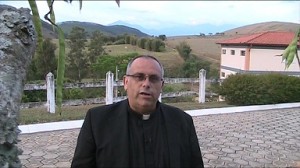Recently, I was talking to a newly ordained priest. He told me how excited he was in his ministry. I warned him that there would be a time that he would become disillusioned, and it was important that this happened.
 That might sound like a strange thing for someone to say to one who is so excited about ministry, but there is a reason. Dietrich Bonhoeffer taught that becoming disillusioned with ministry is one of the most important stages in ministry. It is at that point that a person chooses to go or to stay. The one who stays does so out of his love and commitment to God. He drops all dreams of the way he wants ministry to be and embraces the ministry in the way God wants it done. That action is the importance of doing ministry after one reaches the stage of disillusionment. Now, you can do God’s ministry not your own. This is the stage of that Thomas reached. He planned to be an Apostle in his image of serving Jesus. Now, when Jesus did not act the way he wanted, he decided to give up. As you know every year, I don’t call Thomas Doubting Thomas, I call him Refuse to Believe Thomas. He does not doubt Jesus’ resurrection as much as he is angry that Jesus did not match his mold of this ministry. So he grew angry and rejected Christ.
That might sound like a strange thing for someone to say to one who is so excited about ministry, but there is a reason. Dietrich Bonhoeffer taught that becoming disillusioned with ministry is one of the most important stages in ministry. It is at that point that a person chooses to go or to stay. The one who stays does so out of his love and commitment to God. He drops all dreams of the way he wants ministry to be and embraces the ministry in the way God wants it done. That action is the importance of doing ministry after one reaches the stage of disillusionment. Now, you can do God’s ministry not your own. This is the stage of that Thomas reached. He planned to be an Apostle in his image of serving Jesus. Now, when Jesus did not act the way he wanted, he decided to give up. As you know every year, I don’t call Thomas Doubting Thomas, I call him Refuse to Believe Thomas. He does not doubt Jesus’ resurrection as much as he is angry that Jesus did not match his mold of this ministry. So he grew angry and rejected Christ.
The moment where he comes to realize how wrong he is, is that moment when he gives up all his dreams and aspirations as Apostles and submits himself to the dreams and aspirations of Christ.
As Dietrich Bonhoeffer taught, it is impossible to do ministry if you don’t come to that point and choose Christ.
The Thomas moment is the powerful moment of any vocation in Christ, not only religious life and ordained ministry, but also married life and even the single life of one seeking to serve God as an unmarried Catholic. It is this moment where the choice is made to do the will of God or your will. You will fail in your ministry if you choose to do your will thinking that this is the will of God.
The most dramatic example of this is the famous story of Fr. Walter Czizek, S.J. He was missioned to Eastern Europe during the reigns of both Hitler and Stalin. Indeed, he explains the tactics used against the Church then and they are the same used against the Church now. A city boy from New Jersey, he grew up to be the tough missionary in the midst of all odds. But he ended up being persecuted for his Catholic faith, arrested and jailed in Treblinka prison in the Soviet Union. He spent five years in solitary confinement seeking to know why he had been put in this position when he sought to be a powerful missionary for God. His most painful moment came at the end of that term. He had been interrogated and tortured regularly by the Soviets trying to get him to sign a false confession that he was an anti-Communist spy for the Vatican. Eventually, he broke down and signed the false confession. It was at that moment that he came to see himself as a total failure. But also at that moment that he felt the presence of God in his cell, encouraging him. He learned that it was not God’s plans for him to be a powerful missionary in Eastern Europe. He had other plans for him.
of both Hitler and Stalin. Indeed, he explains the tactics used against the Church then and they are the same used against the Church now. A city boy from New Jersey, he grew up to be the tough missionary in the midst of all odds. But he ended up being persecuted for his Catholic faith, arrested and jailed in Treblinka prison in the Soviet Union. He spent five years in solitary confinement seeking to know why he had been put in this position when he sought to be a powerful missionary for God. His most painful moment came at the end of that term. He had been interrogated and tortured regularly by the Soviets trying to get him to sign a false confession that he was an anti-Communist spy for the Vatican. Eventually, he broke down and signed the false confession. It was at that moment that he came to see himself as a total failure. But also at that moment that he felt the presence of God in his cell, encouraging him. He learned that it was not God’s plans for him to be a powerful missionary in Eastern Europe. He had other plans for him.
His next destination was was the Soviet Gulags. It was there he did the unspeakable in Soviet terms. He secretly ministered in the prisons in those Gulags. They had secret masses with other imprisoned priests and even heard secret confessions of the prisoners. The presence of God was where people would never expect to find it. Yet, he did something else as well. Fr. Walter Czizek lived an ethic that was beyond what could be imagined in the Soviet Union. A friend of mine teaches, the general attitude in Soviet Russia was: “We pretend to work and you pretend to pay us.” Fr. Walter Czizek, now a slave in the Gulags forced to build houses as the Soviets decided to expand into Siberia, decided that he was not working for the Soviets, he was working for God. His forced labor was his opportunity to do his best. Even the other prisoners were upset. They saw not doing well as a sign of protest, but Fr. Czizek said no, that if he was truly going to serve God, he was going to do so as God had called him. So here a slave, he did his best work in building those houses because he was doing this work for God.
His ministry collapsed, it was then he did God’s work and that blossomed beyond his wildest dreams. When he was released from the Soviets after 23 years in prison, he returned to the Jesuit order only to find out they declared him dead after many years of him missing. Obviously they undid their declaration and he died years later happily as a Jesuit.
This is what happens to Thomas as well. His disillusionment led him to discover the real mission of the Apostle and live it into his missionary work as far away as India.
I hope that priest friend remembers what I told him, when things go wrong in his ministry. For it is only then his ministry will truly flourish.
God Bless You,
Fr. Robert J. Carr
You can follow him on twitter as @frbobcarr.

